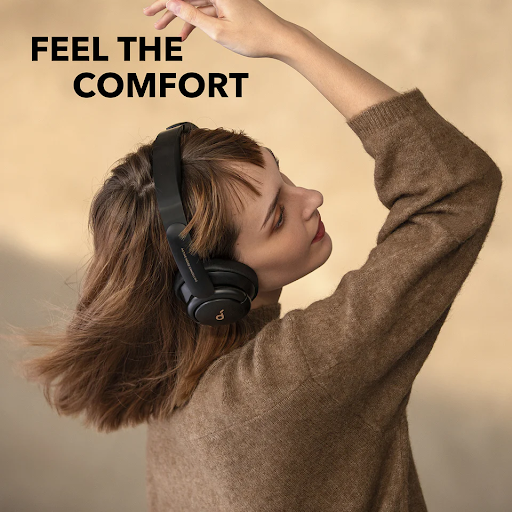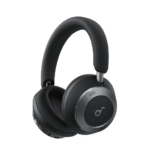With the plentiful distractions in today’s world, the desire for clarity and peace has never been more pressing. Whether you are working remotely, studying in a loud dorm room, traveling, or even attempting to find peace in a packed place, noise cancelling headphones provide a revolutionary solution. Specifically engineered to reduce or eliminate background noise, these headphones provide a focused audio environment like none other.
For someone like me, who used to struggle concentrating in loud sit-down cafes and open office spaces, the investment in a noise canceling pair of headphones changed the game. Genuinely being able to shut out the world and effortlessly tune into the world of crisp sound made deep work, relaxation and everything in between more enjoyable.
What Are Noise Cancelling Headphones?
Noise cancelling headphones are audio equipment that is designed to actively or passively reduce unwanted ambient sounds. There are two primary types: active noise cancellation (ANC) and passive noise cancellation. While passive noise cancellation relies on physical materials such as ear cups and foam padding to block sound, active noise cancellation employs built-in microphones and inverse sound waves to cancel noise before it reaches your ears.
This advance is beneficial to students, remote workers, musicians, and even individuals with heightened sensitivity to sensory stimuli. The effects of sound distraction on mental focus, auditory clarity, and personal wellness are profound.
How Active Noise Canceling Technology Works
The concept of anti-phase sound waves explains both the inner workings of active noise cancelling (ANC) headphones and the phenomenon of destructive interference. Noise is detected, and sound waves are transformed to create the internal, and opposite, phase sound waves. The two waves then cancel each other out.
Modern ANC headphones are exceptional in their ability to cancel a variety of low-frequency noises, including the hum of airplane engines, street traffic, air conditioners, and even the clicking of keys on a keyboard. Some of the newer models implement adaptive noise cancelling, real-time modifications based on the user’s surroundings.
My international flights completely transformed with the use of ANC headphones. I was able to relax or listen to music without the distracting and overwhelming drone of the engine, which considerably improved both concentration and sanity.
Advantages of Noise Cancelling Headphones
The benefits of noise cancelling headphones extend well beyond just sound quality. Perhaps the most notable benefit is improved concentration. While studying for exams or drafting content in noisy environments, ANC headphones enable you to slice through the noise, ensuring your mind remains engaged.
Another benefit that is often not considered is the provision of hearing safeguard. Since the headphones actively work to cancel background noise, you do not have to increase the volume to hear your favorite music or a podcast. This is particularly critical for long-term ear health, especially for students and young professionals who wear headphones for several hours.
Moreover, for commuters and busy travelers, having a personal sound space on congested buses and trains and in the airport is a godsent. Furthermore, headphones aids meditation and relaxation by constructing a disturbance free space that facilitates deep mental concentration.
What to Consider While Buying Noise Cancelling Headphones
- The selection of an appropriate model of noise cancelling headphones is based on several defining parameters. The quality of sound is critical. The audio output should have balanced frequencies and clear articulation at all ranges. Strengthened audio output via codecs aptX or LDAC supports high fidelity audio hence, improving resolution and depth in models.
- If you travel frequently, you would prefer noise cancelling headphones with extended playback time on standby. The luxury offered by ANC headphones with 30 to 40 hours of playback time with noise cancellation activated is unmatched. Additionally, headphones that offer fast charging with hours of playback after a quick charge are certainly a plus.
- For study or work, miss comfort can make or break the experience. Generally, over ear headphones are more comfortable and isolate better compared to on ear or in ear designs due to the use of memory foam ear cups. Personally, lightweight construction and the presence of adjustable headbands also increase comfort and ease.
- If you travel frequently, you would appreciate portability and foldability. The high end models with carrying cases and airplane adapters are not only convenient but also helpful.
- Lastly, ambient sound mode, EQ settings, voice assistant features, and touch controls offer personalization as well as auxiliary functions. These allow for better functionality and a more refined listening experience blended with one’s lifestyle.
Who is a Suitable User for Noise Cancelling Headphones?
The use of noise cancelling headphones is applicable and advantageous for a wide-ranging audience. Students are able to access focused study zones that shield them from dorms and campus chatter. Professionals working from home are able to stay focused and engaged during virtual meetings and other professional calls shielded from household distractions. For musicians and audio editors, sharpening their skills becomes easier and more precise without pesky background noise.
Noise cancelling headphones are a blessing for travelers as well, as they allow for naps and immersive entertainment during long journeys. More than that, casual listeners, too, can experience a refined and quieter sound both at home and during commutes.
Personally, I found having a reliable pair of noise cancelling headphones to be a great asset as a content writer and freelancer. It provided me with controlled music for my workspace from virtually anywhere.
FAQS
Do noise cancelling headphones completely block sound?
Noise cancelling headphones tend to be very effective for low-frequency sounds such as engines and air conditioning. But they may not completely block sharp or high-frequency sounds. Nevertheless, noise cancelling headphones significantly reduce noise.
Are noise cancelling headphones effective for studying?
They are great for studying as they are effective in eliminating background distractions. This is helpful for students whenever they are in a library, dorm, or coffee shop.
Can you sleep with noise cancelling headphones?
Lightweight ANC headphones can help with sleep especially when trying to block out things like snoring or city sounds. However, these may be uncomfortable for side sleepers.
Do noise cancelling headphones cause damage to ears?
Not, if used correctly. ANC headphones can, in fact, protect a user’s hearing because they allow lower volume listening, unlike regular headphones that background noise forces people to crank the volume.
What is the difference between active and passive noise cancelling?
Passive noise cancelling uses physical barriers such as the headphones ear cups to block sound. In contrast, active noise cancelling uses technological sound wave interference to eliminate noise. The best headphones combine the two.
Final Thoughts
In today’s world, filled with various forms of disturbance, I, as a seasoned professional, strongly argue that a reliable pair of noise cancelling headphones squarely qualifies as one of the smarter investments. It allows students to focus on their studies, professionals to become more productive, and it offers tranquility to the people who simply value that.
In my case, I have come to recognize the importance of noise cancelling headphones, as they have become a vital part of my daily workflow. They allow me to concentrate, relax, or simply relish the pleasure of undisturbed audio on demand.
Whether a noise cancelling headphone is required for academic or professional ventures, I firmly believe that both the modern and the traditional toolkit for success need to now include a noise cancelling headphone for the modern and sharp lifestyle of a person.

















